- Home
- Herbie Brennan
The Faeman Quest Page 4
The Faeman Quest Read online
Page 4
Some academics maintained that cloud dancers, as a species, were distantly related to vampires, but to Brimstone the creature looked far more like a ghoul. It was tall and thin and caped and fanged with the pallor and transparency of a ghost. Despite its fragility, it was capable of physical attack – dancers had been known to suck their victims dry of blood – but that was not the greatest danger. The greatest danger was that the thing could reach into your mind; which was exactly what this one did.
Most men would have crumbled at once. But Brimstone was a trained demonologist who’d spent nine years in Arcane School learning the mental techniques that allowed him to communicate with demons in the good old days before Queen Blue spoiled everything. The disciplines had toughened his mind to a degree that allowed him to withstand the initial attack.
With the creature thrown back, Brimstone created an imaginary sea-chest of thick oak with metal bandings and used it to store all thoughts and memories of the angel. Then he wrapped it in imaginary chains, fastened the chains with triple padlocks and swallowed the imaginary key. The cloud dancer recovered and threw itself against the chest. Brimstone concentrated so that the chest withstood the attack. The cloud dancer redoubled its efforts, but the chest remained sound. Brimstone allowed himself a little smile.
The little smile was probably a mistake, for it threw the cloud dancer into a paroxysm of fury. But now, instead of hurling itself futilely against the impregnable chest, it dived down Brimstone’s throat in search of the key. Brimstone mentally grabbed its feet and began to drag it back up again. The cloud dancer twisted, slid back up into his head and, in a fit of pique, began methodically to dismantle his brain.
‘It got a bit fuzzy after that,’ Brimstone concluded.
‘But it never found out about the angel?’
‘No, it never found that out.’
‘It just sent you barking mad?’
Brimstone snorted. ‘That’s what happens when you have a dismantled brain.’
Chalkhill was licking his lips again, but without the pervy light in his eye this time, which meant he was about to ask something important. ‘Is it true that when you’re attacked by a cloud dancer, it leaves you very sensitive?’
‘It usually leaves you dead.’
‘Yes, but when it doesn’t leave you dead. As in your case, Silas. If it doesn’t leave you dead, is it true it leaves you very sensitive?’
Brimstone leaned a casual elbow on the edge of the window. Chalkhill planned to kill him, of course, as did most of his former friends, but probably not quite yet. His questions, the way he held himself, the involuntary movements of his ears all suggested he was up to something – something for which he needed Brimstone’s help. Brimstone gave the hand signal that put George back on stand-by and said, ‘Oh yes, very sensitive.’ He leaned forward to stare into Chalkhill’s face. ‘Very sensitive indeed.’ He allowed himself to sink back into the buttoned leather seats of the ouklo interior. ‘Once they put your brain back together, that is.’
But Chalkhill ignored the sarcasm in his enthusiasm to scrabble from his pocket something white and lacy, which he waved in front of Brimstone’s face.
Brimstone drew back quickly. ‘What’s that?’
‘It’s a handkerchief, pronounced hankerchief or sometimes hankie. Humans use them.’
‘What for?’
‘To blow their noses.’
Brimstone stared at the handkerchief, then stared at Chalkhill. ‘What do they do with the result?’
‘After they’ve blown? They wrap it up and keep it in their pocket.’
Brimstone shuddered. ‘Gross. And I’ll thank you to stop waving that thing in my face.’
‘It’s all right,’ Chalkhill said, ‘it hasn’t been blown into yet.’ He leaned forward. ‘Listen, Silas, I want you to sniff this.’
‘No,’ Brimstone said.
‘It belongs to … a certain person.’
‘Who?’ Brimstone asked immediately.
‘I’d prefer not to tell you.’ Chalkhill composed his features into a look of sympathetic caring. ‘It would be better for you not to know.’
Which might well be true, Brimstone thought, since Chalkhill was clearly trying to suck him into another of his convoluted schemes. ‘What do you want, Chalkhill?’ he asked crossly.
‘What I want is for you to smell this, then track down where its owner is now.’ He smiled. ‘Like a bloodhound.’ The smile vanished. ‘You can do that now, can’t you? Now you’re sensitive?’
Brimstone hesitated. He probably could. He’d certainly developed some very peculiar powers since Dr Philenor remantled his brain. He could see George, for one thing, when nobody else could; and he could hear cockroaches talking to each other. Tracking somebody down like a bloodhound might not be beyond the bounds of possibility. And even if he couldn’t, it might be worth his while pretending. Although he was free of the lunatic asylum now, his funds were limited – much of his property had been sold off to pay for treatment – and Chalkhill had always been a bit of a cash cow in the past. Brimstone looked at him steadily.
‘What’s in it for me?’ he asked.
Eight
It was sooo exciting. Mella had never seen a human kitchen before and this one was absolutely nothing like the kitchens of the Purple Palace. They were huge, with great black log-burning stoves, enormous roasting pits and no less than seven rainbow-coloured flavour chambers humming with spell power. This human kitchen was extremely small by contrast, with no roasting pit at all, no open fires of any sort and no stoves that she could see, while the only thing remotely like a flavour chamber was a white metal box on a countertop that would hardly hold a chicken, let alone an ox. All of which begged the question: how did these people cook? There was nothing, absolutely nothing, here that looked like it might do the job. Yet there were pots and pans hanging from hooks on the ceiling, so cooking must be done somehow.
‘What’s that?’ she asked Aunt Aisling, pointing to a coffin-sized cabinet standing upright by one wall. Like much of the equipment here, it had been painted white, so it was unlikely to contain a corpse. But you could never be sure. Some of the earliest faerie histories mentioned humans who ate each other!
Aisling glanced at her in surprise. ‘It’s just a refrigerator. Don’t you have one at home?’
Mella almost winced. Home was supposed to be New Zealand where, she supposed, they must have refrigerators, whatever refrigerators might be. But she recovered quickly. ‘Oh, yes, of course. It’s just ours is a different … design.’ She’d have to be very careful. The last thing she needed was to raise Aunt Aisling’s suspicions, although Aunt Aisling was very, very unlikely to guess where she really came from. Mella allowed herself a small, secret smile.
‘Would you like a cup of tea?’ Aisling asked.
Mella’s smile vanished abruptly. Her father had warned her there were two drinks that were dangerous to faeries when they visited the Analogue Realm. Well, not dangerous exactly, not poisonous or anything, but tricky. One was coffee, which seemed to have very little effect on humans – all it really did was keep them awake – but acted as a psychedelic on faeries, triggering visionary experiences. The other was tea, which Aunt Aisling was offering now. The trouble was, Mella couldn’t remember what Henry had told her tea did to faeries. He’d only mentioned it once when she was a lot younger and hadn’t really been paying attention. She hesitated, realised hesitation might seem suspicious, realised tea drinking was a common ritual among humans, tea drinking was expected, tea drinking was probably compulsory in New Zealand, remembered too that she was only half-faerie so it would probably have no effect at all, then said, ‘Yes, please.’
‘You put the kettle on,’ Aisling said. ‘I’ll find the pot. Earl Grey all right for you? Mother never seems to have anything else.’
Who was Earl Grey? What was Earl Grey? Maybe there were different types of tea. She took a deep breath. She was committed now, so it hardly mattered what type of tea she drank: she didn’t
know what any of them was likely to do to her. ‘Yes, fine,’ she said. She’d read somewhere that human girls her age would signify assent by saying Cool, but she’d also read that the English always drank tea hot, so that would hardly be appropriate. Analogue life was proving a lot more difficult than she’d anticipated.
The kettle was easy enough. The design was much the same here as in the Faerie Realm, and while the kettle on the countertop was smaller than those in the Purple Palace kitchens and there was a funny little tube sticking out the back at the bottom, it was definitely a kettle. She picked it up and once again looked around for a fire. ‘Where do I put it on to boil?’
‘Is there water in it?’ Aisling asked.
Oh Gods, Mella thought. Where was the well in this little kitchen? Did it have a pump, or would she have to draw water in a bucket? There were no spells, that was the trouble. You had to do positively everything yourself. She shook the kettle experimentally and discovered to her relief it was already half full. ‘Yes, there is.’
‘Plug it in beside the sink.’
Plug it in? When the servants wanted to boil a kettle without using up a spell cone, they hung it over an open fire. But plug it in? How did you plug in a kettle? To play for time she moved slowly over to the sink – she knew what a sink was – and looked around vaguely.
‘Plug’s beside the microwave,’ Aisling said helpfully.
What, in the name of the Old Gods, was a microwave? For the first time since she’d arrived in the Analogue Realm, Mella began to feel she was drowning. Then suddenly she noticed the wording on the chicken-sized flavour chamber: Siemens HF26056GB 1000 Watts Microwave. Brilliant, but what now? Plug it into the microwave? No, Aunt Aisling said beside the microwave. Mella felt her mind move into a higher gear, as it sometimes did when she was faced with an emergency. There were several pieces of kitchen equipment beside the microwave, but only one of them looked anything like what she was searching for: a black rubbery snake with a short, thick tube thing on the end. A plug? It might be a plug. It might be the plug. But the interesting thing, maybe the important thing, her whizzing mind told her, was that the plug (?) looked as if it might fit into the tube sticking out of the kettle. She tried pushing it in. At first it wouldn’t go, then she twisted it slightly and in it slid! Mella set the kettle down triumphantly.
‘You’ll have to switch it on at the wall,’ Aisling said.
Mella’s eyes slid along the black snake. At the far end from the kettle, it entered the wall by way of a peculiar plate. On the plate was a switch. But Mella knew how to operate switches. She pressed this one down with a feeling of triumph. To her relief, Aunt Aisling was no longer watching her, but had opened a cupboard and taken out a smaller, pot-bellied kettle with its handle on the back. Unlike real kettles, this vessel wasn’t used in the Faerie Realm at all, but she knew what it was from pictures: a teapot. She watched with fascination as Aunt Aisling spooned dried herbs into it from a yellow container.
‘I hate tea bags, don’t you?’ Aisling said mysteriously.
‘Positively loathe them,’ Mella told her.
Minutes later, Aisling was pouring out two cups of amber liquid. ‘I do hope you don’t take milk with Earl Grey,’ she murmured.
Mella gave an ostentatious shudder as she carried her cup to the table. ‘Never touch it.’ She could wing this conversation, she knew she could. She’d winged it beautifully already because clearly Aunt Aisling didn’t suspect a thing. All she needed to do now was steer it. And keep her wits about her. And pick up as much about the Analogue World as possible. Things were actually working out rather well. Aunt Aisling was pretty stupid, according to her father’s journal. It was just as well to get in a little practice with her before she met her grandmother, who wasn’t stupid at all. She smiled benignly at Aisling and took her first sip of Earl Grey tea.
She tasted the bergamot at once and liked the way it blended into the smoky, dusty flavour of the tea itself. No wonder this drink was popular in the Analogue World: it was seriously delicious. She took another sip before remembering to go slowly. This was an infusion faeries were warned about and, while she was only half-faerie, there was still a 50/50 chance it would affect her. So careful was the keyword. ‘Nice tea,’ she remarked. It seemed a safe, sophisticated thing to say.
Aisling asked suddenly, ‘What age are you, Mella?’
‘Fifteen. Nearly sixteen. Why do you ask, Aunt Aisling?’
Aisling shrugged. ‘I was just surprised Henry let you make the journey all on your own.’ She looked seriously at Mella. ‘Without telling us. We could have met you at the airport.’
This one she’d been expecting. Mella smiled. ‘Actually, I was surprised you didn’t. I’ve been wondering if Grandmother didn’t get Father’s letter.’ She batted her eyelids innocently. This was the heart of the story she’d concocted, cunningly contrived not just to explain her unexpected appearance, but to make everyone else feel guilty about it. There was no letter, of course: how could there be?
‘Henry wrote to Mother about your visit?’
Mella nodded enthusiastically. ‘Oh, yes, of course. Telling her all about my visit and asking if I could stay with her. He didn’t mind me taking the flight on my own – he said he wanted me to learn independence – but he thought Grandmother might meet me at the airport, or arrange for somebody else to.’ She took another sip of her tea and looked at Aisling benignly. ‘I didn’t really mind when there was no one there. It’s really not so far from Heathrow. I took a taxi.’
‘What?’ Aisling asked. ‘All the way from Fairyland?’
Nine
Consolidated Magical Services had done quite a good job with their Body in a Box, but it lacked one obvious feature. There were no wheels built into the onyx cube and the delicate solid-state spell circuitry meant none could be attached once it was factory-sealed. As a result, when Lord Hairstreak wanted to go anywhere, the whole contraption had to be loaded on to a wheelbarrow and pushed to its destination with his head wobbling on top. The only servant he would trust with this task was an ancient family retainer called Battus Polydamas, who wheezed and complained incessantly, but knew how to keep secrets and would have given his life for his master.
‘Careful, Batty!’ Hairstreak screamed as the barrow hit a bump and the cube swayed alarmingly. If the thing ever toppled over, there was a risk that the connections would snap and his head roll off across the floor. It wouldn’t kill him, of course – the head was indestructible thanks to the safety spells – but the experience was always disorienting. Furthermore, reattachment was painful and could take anything up to a week, during which he was unable to communicate except by eye-blinks.
‘Careful, is it? We want careful?’ Batty muttered. ‘You mind your manners, young Master Hairstreak, and don’t try to teach your grampa how to suck slugs.’ He wheezed and tugged the barrow round in order to negotiate a corner. The cube began to sway in the other direction.
The violent weather spells that marked the approaches to Lord Hairstreak’s Keep stood in stark contrast to the weather spells located in the sky above the building’s central courtyard. When the Duke of Burgundy had owned the Keep, this vast area was paved with granite and used exclusively for military manoeuvers. One of Hairstreak’s first actions when he began to recover his fortune was to change all that. Teams of gnomes were called in to break up the stone, topsoil was imported by the ton and the fashionable Forest Faerie designer Celadon was hired to create a garden. Not one single specified plant (with the exception of grass) would grow naturally at the northerly latitude of the Keep, but Hairstreak was taken by the scheme and approved the cost of the weather spells that would make it possible. The result was an extraordinary – and in places extraordinarily challenging – creation unlike any other garden in the entire realm. His great-niece now lived there permanently and consequently only Hairstreak ever visited it. The magical securities around the perimeter were set to spectacularly lethal levels. Batty was the only servant who could pass t
hem safely; and even then, only when he was barrowing the cube.
Hairstreak felt the hot, humid air on his face as they entered the approach corridor and experienced a pleasant tingle of anticipation in the centre of his cube. He enjoyed these little garden jaunts for more than one reason. His great-niece was quite delightful, of course, just at that age when children ceased to be children and formed entertainingly fatuous opinions of their own. But unlike most teenaged faeries – Lighters or Nighters – she was unfailingly polite to him and affectionate; one might even say loving. As he’d trained her to be, of course, but an unusual experience for Hairstreak just the same. He quite looked forward to these little visits, although he purposely limited them to once a week: it would never do if the girl became too familiar. At the moment she remained in awe of him, a useful reaction that could only be maintained by distance. In his experience, familiarity all too often led to the discovery of one’s weaknesses and at the moment he had all too many weaknesses waiting to be discovered, any one of which might prove fatal to his plans. The last thing he needed was to have to kill her. That would mean scrapping years of effort and starting afresh, something that scarcely bore thinking about.
As he bumped through the archway into the open air, the full, lush beauty of the gardens struck him like a physical blow. In some ways the loss of his natural body had proven a boon; and this was certainly one of them. The cube enhanced all his senses, except touch, so that when he happened upon something aesthetically pleasing, like a painting, concerto, olbonium or a natural wonder such as this garden, his appreciation was heightened several-fold. He often wondered what it would be like when he ruled the Realm and could order the wonders of the world transported to his doorstep. It was difficult to imagine the sheer delight he would experience, but it was something to which he looked forward enormously.
The spell-driven securities were, of course, invisible and randomised, but anyone venturing beyond the low perimeter hedge could confidently expect to be vapourised within ten to fifteen seconds. With some exceptions, of course. Hairstreak could come and go as he pleased, barrowed by Batty, but the girl could not. Although the spells would not kill her, she was absolutely confined to the inner gardens in order to ensure no one, servant or visitor, caught an accidental glimpse of her. But within those inner gardens, all her needs were met. She had her own home. She had a range of magical entertainments. She had two endolg pups for company: neither would develop speech for at least another year, by which time it would be too late to damage his plans. Her servants were all an advanced type of golem, programmed to self-destruct rather than reveal her existence.

 Through the Wardrobe
Through the Wardrobe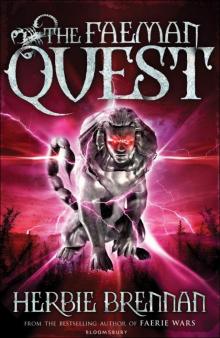 The Faeman Quest fw-5
The Faeman Quest fw-5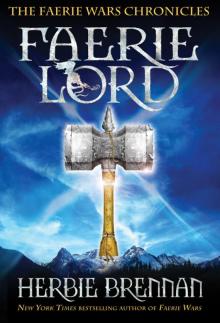 Faerie Lord
Faerie Lord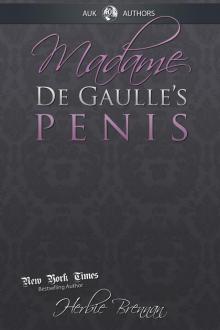 Madame de Gaulle's Penis
Madame de Gaulle's Penis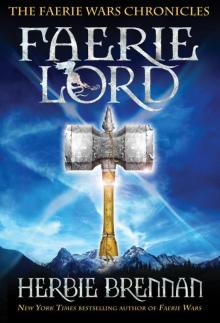 Faerie Lord fw-4
Faerie Lord fw-4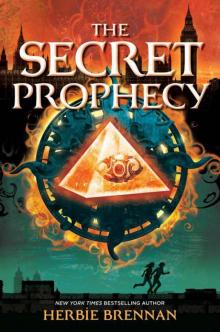 The Secret Prophecy
The Secret Prophecy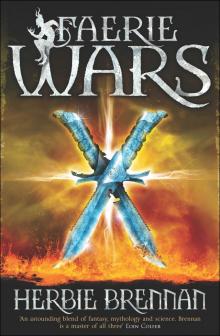 Faerie Wars
Faerie Wars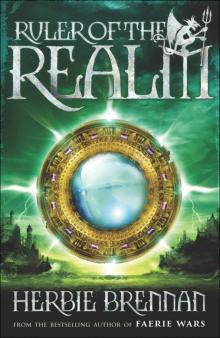 Ruler of the Realm
Ruler of the Realm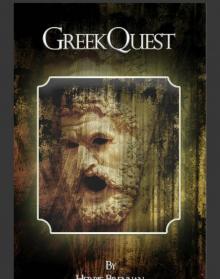 GreekQuest
GreekQuest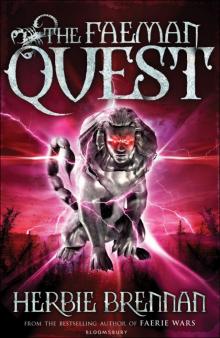 The Faeman Quest
The Faeman Quest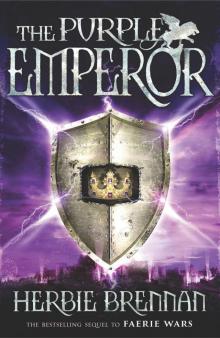 The Purple Emperor
The Purple Emperor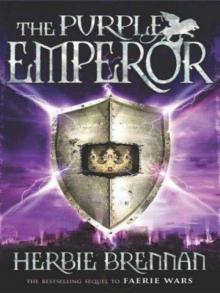 The Purple Emperor fw-2
The Purple Emperor fw-2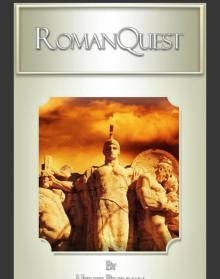 RomanQuest
RomanQuest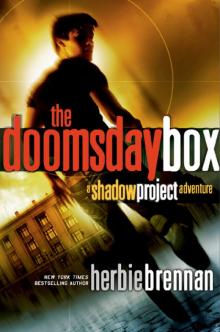 The Doomsday Box
The Doomsday Box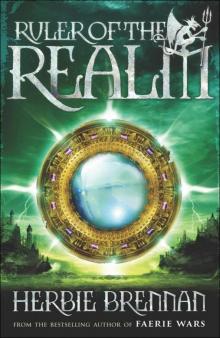 Ruler of the Realm fw-3
Ruler of the Realm fw-3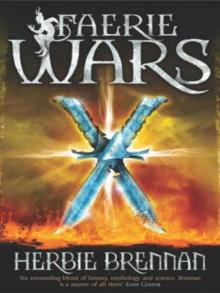 Faerie Wars fw-1
Faerie Wars fw-1